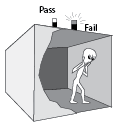Turing Test is species biased
Failing the Turing Test proves nothing about general intelligence because only humans can pass it.

Intelligent nonhuman entities (such as intelligent machines, aliens etc) could never pass the test, because they would not be able to answer subcognitive quesitons. Such questions can only be correctly answered on the basis of a specifically human associative network of representation.
Ratings games -- which ask a subject to judge the strength of an "associative paring" between two terms -- reveal the subcognitive underpinnings of human intelligence and provide an experimental basis for formulating subcognitive questions that only humans could answer.
For example, in the 'neologism rating game', a subject is presented wth a new term, like 'Flugly', and asked to rate it as a name for various things:
- a child's favourite bear
- the name of a glamorous movie star, or
- the name of a character in a W.C. Fields movie.

Only humans could answer such questions plausibly, on the basis of subcognitive associations.
Robert French, 1990.